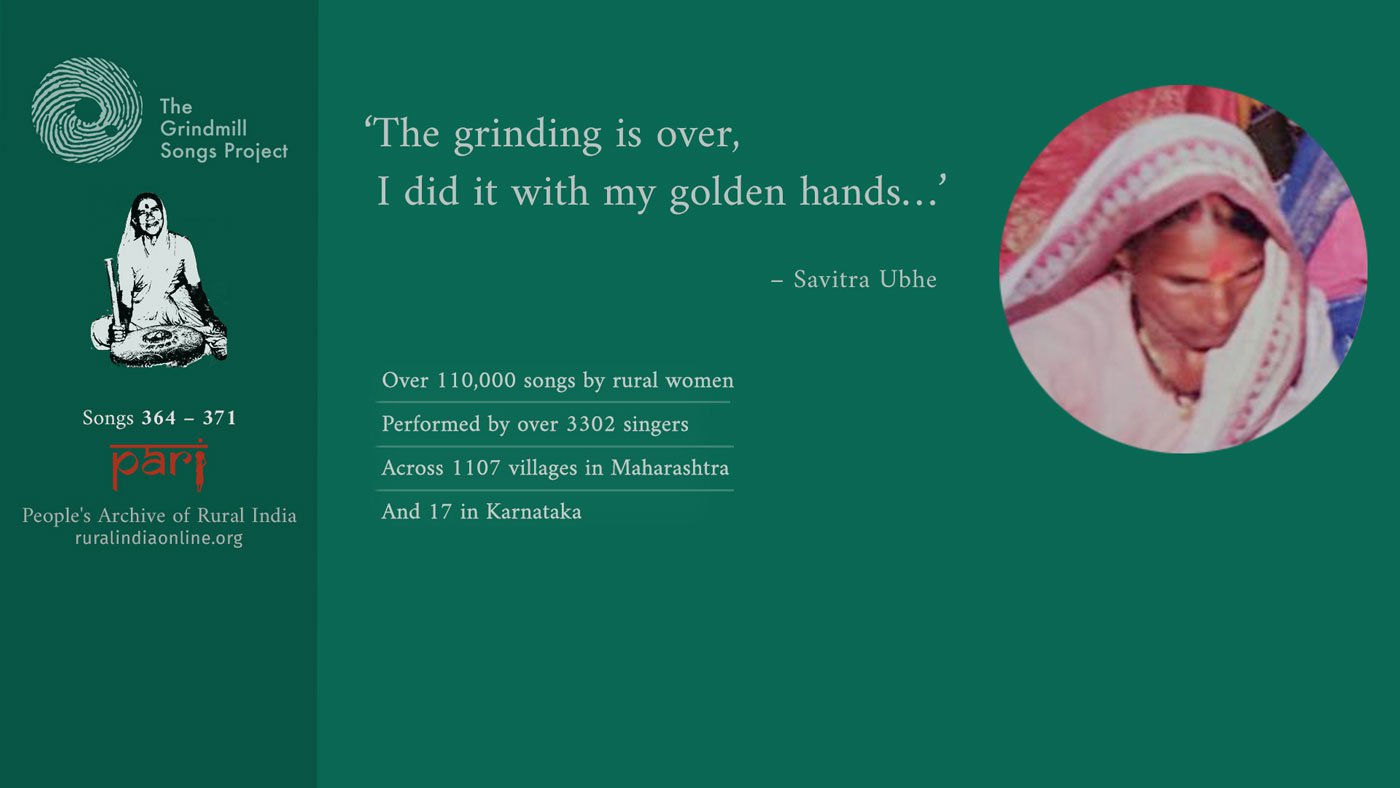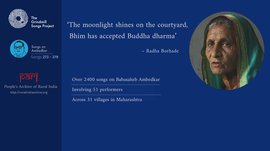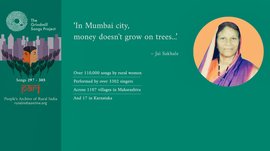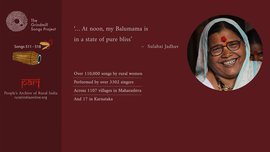Savitra Ubhe and others sing eight ovi about grain being ground while an anguished sister dwells on a quarrel with her brother as life goes on around her
Brother and sister are quarrelling in the fields
Sister has tears in her eyes, brother’s mind is filled with worry
In this first ovi , the singer remembers a sister’s quarrel with her brother. Only the fields and the wilderness around them are a witness to it. Is this a silly fight between playmates from their childhood days? Or is it a tussle in their adulthood over worldly matters like ownership of the family farmland? The sister’s eyes well up with tears; she knows that if the brother sees her tears, he will worry for her.
Savitra Ubhe, Tara Ubhe and Mukta Ubhe from Khadakwadi hamlet of Mulshi
taluka
, Pune, sing in their powerful voices eight
ovi
in this instalment of the Grindmill Songs Project. They begin with the
galaa
, a tune that is usually composed by the singers themselves but sometimes borrowed from the traditional musical forms like
lavani, gaulan
or
abhang
. It is often a hum that precedes the singing of the actual
ovi
, but sometimes it can also become, as in this case, a refrain, that follows each line of the song. The three-line verse expresses a sister’s anguish over a quarrel with her brother and sets the tone for the entire cluster of couplets:
Now, instantly
Take the flowers from his hands
Let him go empty-handed
When her brother brings flowers to pacify her, she sulks and tells her friends to take the flowers and to let him go empty-handed. It seems she is not even going to speak to him. But it could also be that she has nothing to give in return. The lines hint at an undercurrent of her deepest realisation: “What do I have? I have nothing while you have everything.” The sweet affection between a sister and brother is conflicted over the socio-economic disparity between men and women in our patriarchal society.
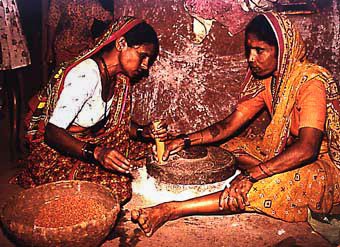
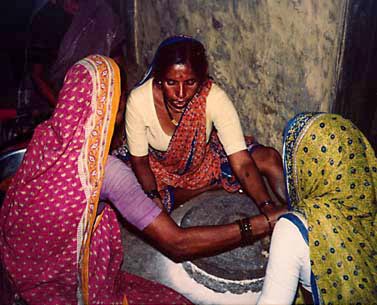
Archival photos of women sitting together and grinding grain in the stone mill, taken by the original GSP team
From the second to the eighth, every ovi begins with the words “the grinding is over” – it seems like repeating this while continuing to work at it would make the difficult daily chore easier. The woman at the grindmill puts a cover over it, and tells us that the sun and the moon will guard this essential possession.
As the work gets on, she spots her son at the doorstep and her words, “he has arrived, like a tiger,” denote her pride in him. She goes on grinding with her “golden hands,” signifying the prosperity she brings while working on the stone mill that belongs to her fortunate family.
The sifting pan where she keeps the freshly ground flour is almost full when she notices her son putting a spot of
abir
, the black vermillion powder, on his forehead, just above the sandal paste he has already applied there. This is a tradition among the devotees of Lord Vitthal of Pandharpur. Her son now resembles the towering image of Lord Vitthal himself and as if it were the god’s blessings on her family, she can see a
kewda
, the fragrant screw-pine flower, in her sifting pan.
When the grinding comes to an end, the singer feels Goddess Lakshmi’s presence over her grindmill. Once again, this signifies a divine blessing for the prosperity of her family. She notices her brother-in-law, Saravana, at their doorstep and pulls the end of her sari from her shoulders over her head. It is a custom that is still practiced among women in many communities of Maharashtra. The gesture is also a mark of respectability of women, especially among married women.
Until the end of the eight couplets, the refrain continues as the sister dwells on the anguish over the quarrel with her brother.
बाई बहीण भावंडाचा, यांचा झगडा रानवनी
बाई बहिणीच्या डोळा पाणी, बंधु चिंतावला मनी
असं सरीलं दळयाण, जात्या ठेविते झाकयण
जात्या ठेविते झाकयण, चांद सुरव्या राखयण
असं सरीलं दळयाण, सूप सारुनी आला दारी
असा बाळ ना माझा, आला वाघाची याची स्वारी
असं सरीलं दळयाण, माझ्या सोन्याच्या हातायानी
माझ्या सोन्याच्या हातायानी, भाग्यवंताच्या जात्यायानी
सरीलं दळयाण, आलं सुपाच्या बांधावरी
आता ना माझा राघु, अबीर लेतो गंधावरी
असं सरीलं दळयाण, माझ्या सुपात केवयडा
असा पंढरीचा विठू, माझ्या बाळाच्या येवयढा
असं सरीलं दळयाण, पदर घेयाचा माथ्यावरी
अशी लक्ष्मीबया आली, माझ्या भरल्या जात्यावरी
असं सरीलं दळयाण, खांद्याचा पदर डोईवरी मी घेतयला
दीर माझ्या तू सरवणा गं, उंबऱ्यावरती मी देखियला
गळा
आत्ताच्या आत्ता
याच्या हातीची फुलं घ्या गं
याला रिकामा जाऊ द्या गं
bai bahīṇa bhāvaṇḍācā yāñcā jhagaḍā rāṇīvaṇī
bai bahiṇīcyā ḍōḷā pāṇī bandu cintāvalā manī
asa sarīla daḷayāṇa jātyā ṭhēvītē jhākaṇa
jātyā ṭhēvītē jhākaṇa cānda survyā rākhaṇa
asa sarīla daḷayāṇa sup saruyīnī āla dārī
asa bāḷānāyācī mājhyā ālī svārī
asa sarīla daḷāyāṇa mājhyā sōnyācyā hātāyānī
mājhyā sōnyācyā hātāyānī bhāgyavantācyā jātyāyāṇī
sarīla daḷayāṇa āla supācyā bāndhāvarī
ātānā mājhā rāghu abīra lētō gandhāvarī
asa sarīla daḷāyāṇa mājhyā supāta kēvayaḍā
asa paṇḍharīcā viṭhū mājhyā bāḷācyā yēvayaḍhā
asa sarīla daḷayāṇa padara ghēyācā māthyāvarī
aśī lakṣmībāī ālī mājhyā bharalyā jātyāvarī
asa sarīla daḷāyāṇa khāndyācā padāyāra ḍōīvarī ghētayālā
dīra mājhyā tū saravaṇā tulā umbaryāvarī dēkhīyīlā
gaḷā
āttācyā āttā
yācyā hātīcī phulaṁ ghyā gaṁ
yālā rikāmā jā'ū dyā gaṁ
Brother and sister are quarrelling in the fields
Sister has tears in her eyes, brother’s mind is filled with worry
My grinding is over, I cover the grindmill
I cover the grindmill, the sun and the moon are guarding it
Grinding is over, I cleaned and [he] came near the door
Here is my son who has arrived, like a tiger
My grinding is over, I did it with my golden hands
I did it with my golden hands on the grindmill of a fortunate, prosperous family
Grinding is over, the flour has filled the sifting pan up to the brim
Now my
raghu
, my son, applies
abir
above the spot of sandal wood paste [on the forehead]
Grinding is over,
kewda
flower in my sifting fan
Vithu from Pandhari is as big as my son
My grinding is over, I take the end of my sari over my head
Goddess Lakshmi has come to my grindmill with flour overflowing
Grinding is over, I take the end of my sari from the shoulder over my head
Saravana, my brother-in-law, I saw you on the threshold
The refrain
Now, instantly
Take the flowers from his hands
Let him go back empty-handed
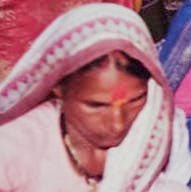
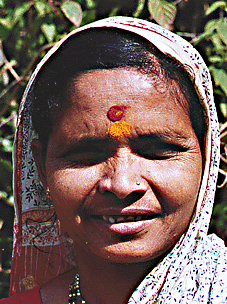
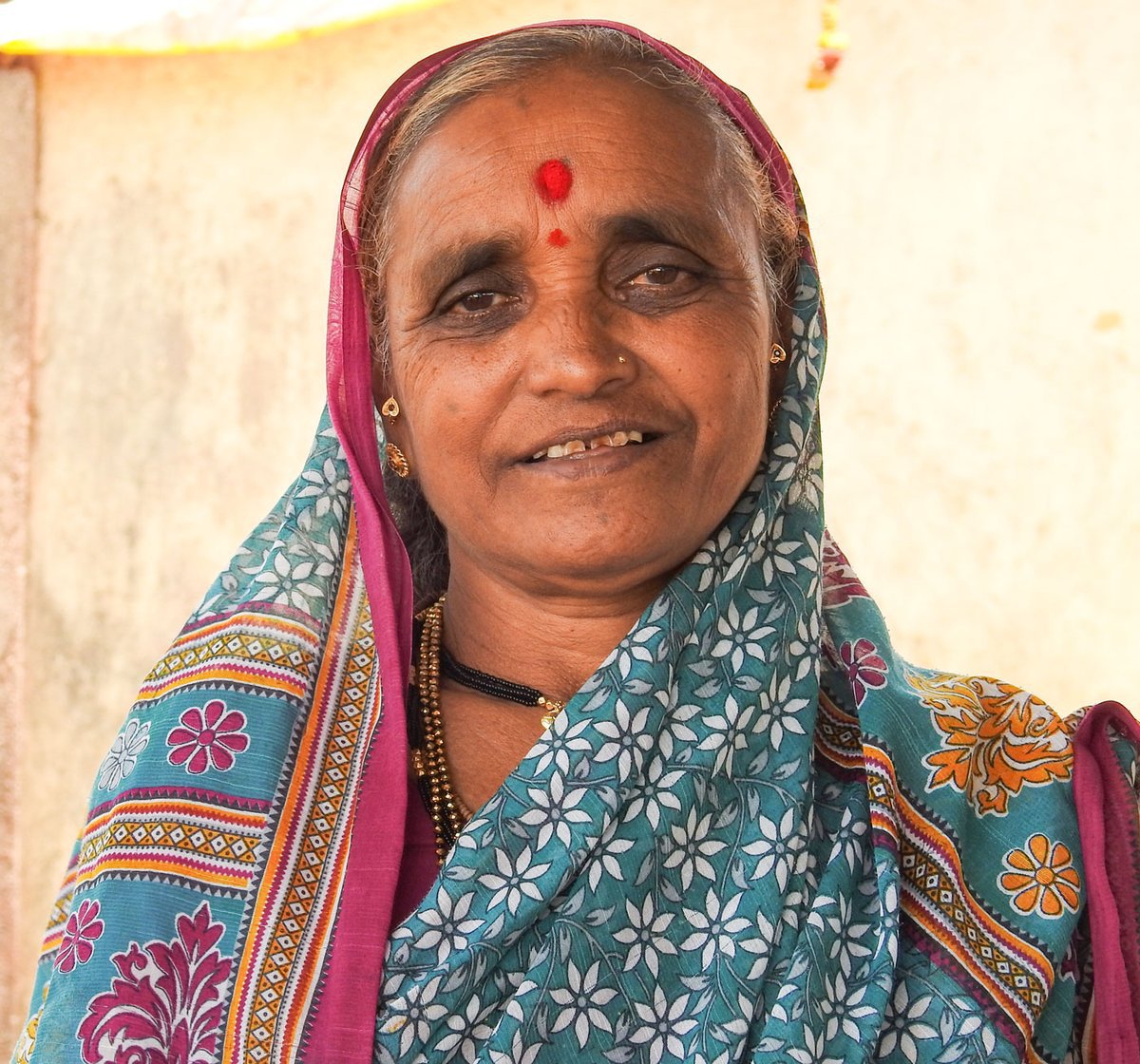
Savitra Ubhe, Tara Ubhe and Mukta Ubhe
Performers/Singers : Savitra Ubhe, Tara Ubhe, Mukta Ubhe
Hamlet : Khadakwadi
Village : Kolavade
Taluka : Mulshi
District : Pune
Caste : Maratha
Date : The songs were recorded on June 1, 1996